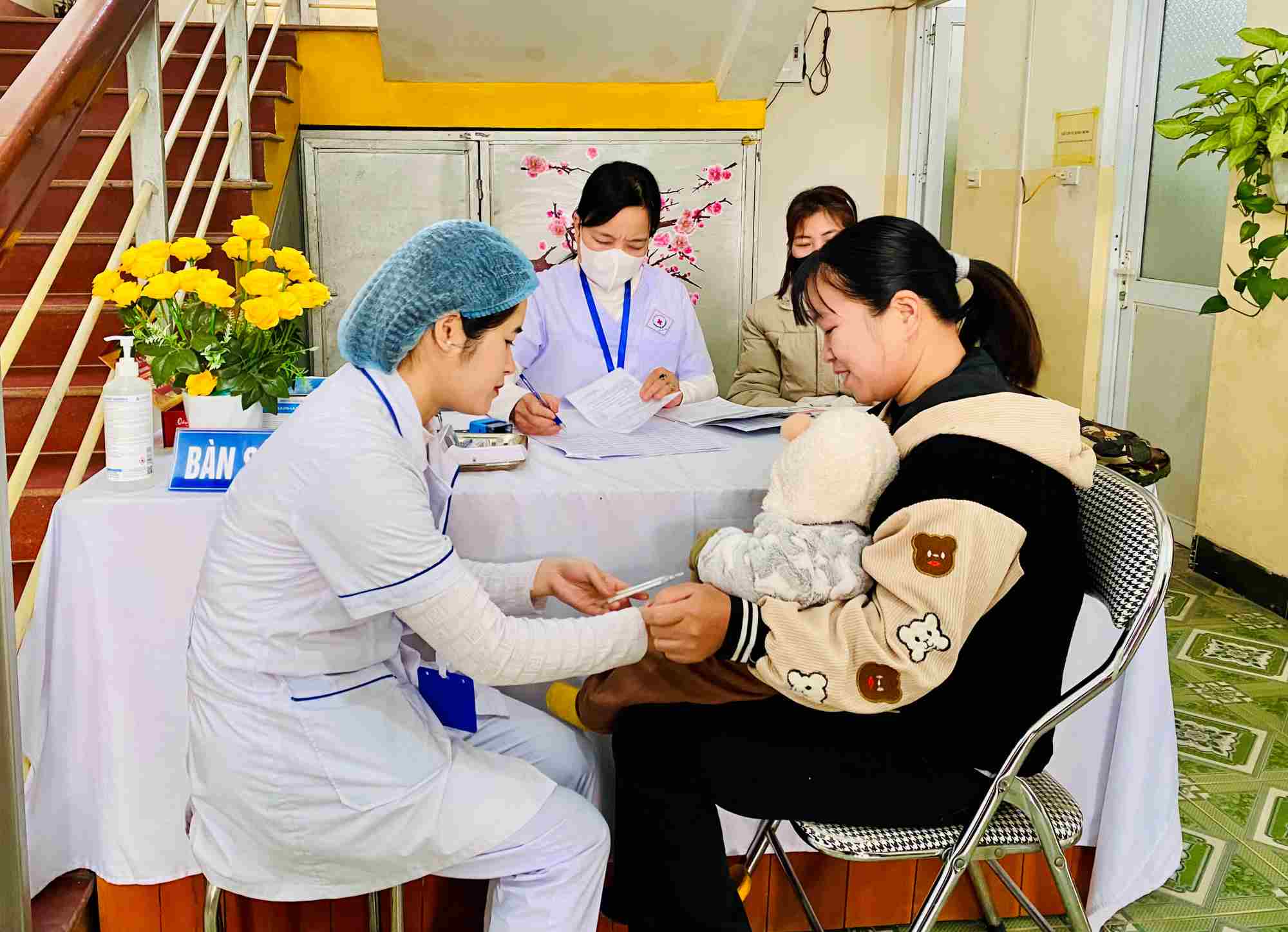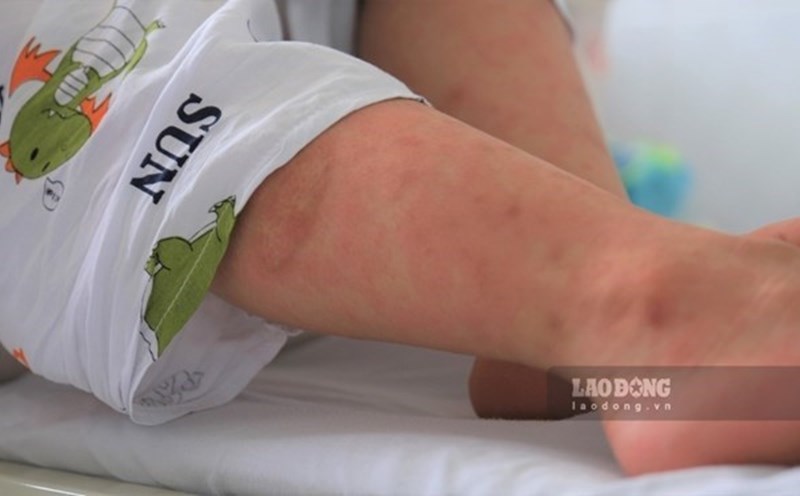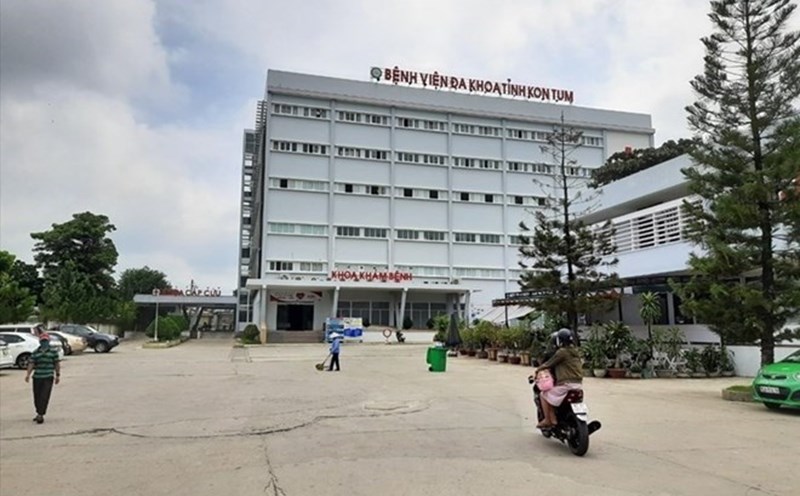High risk of infection, vaccine is the only weapon
A 44-month-old child in Nam Tu Liem district (Hanoi) died of measles complications, warning about the spread and dangers of the disease. Dr. Truong Huu Khanh - Vice President of the Ho Chi Minh City Infectious Diseases Association - said that measles can infect 18 people and be vaccinated as soon as possible to prevent the disease.
Measles can be spread 4 days before the rash, and even if it is not rashed, it can still be contagious. The disease is transmitted through hand, clothes, and belongings, making control difficult. Adults with measles often have mild symptoms but are spread to young children, pregnant women and the elderly.
According to experts, people who are not immune (not vaccinated or do not have measles) are at high risk of measles. Dr. Khanh emphasized that to break the infection chain, the measles vaccination rate needs to reach 95% or more.
Dr. Hoang Minh Duc - Director of the Department of Prevention and Control (Ministry of Health) - said that the majority of measles cases are currently children from 9 months to under 15 years old, accounting for 72.7%. In particular, more than 95% of patients have not been vaccinated or their vaccination status is unknown. Measles outbreaks are mainly concentrated in big cities, but are also increasing in mountainous provinces.
Although the measles epidemic has shown signs of decreasing, caution is still needed and suspected cases in the provinces continue to be closely monitored, especially in ethnic minority areas and areas with difficulty accessing medical services. However, thanks to strong epidemic prevention measures such as containment, control and vaccination, the epidemic situation is currently well controlled.
Provinces and cities are urgently implementing vaccination according to Official Dispatch No. 23/CD-TTg dated March 15, 2025 of the Government, implementing the second vaccination campaign in 2025 in 54 provinces and cities.
The Department of Prevention and Control requests the Departments of Health of provinces and cities to continue to closely monitor the epidemic, coordinate with medical facilities to assess the situation and propose timely solutions. Districts with high numbers of cases will be prioritized for vaccination, ensuring the completion of the campaign in March 2025. At the same time, localities also need to deploy expanded immunization, catch-up vaccination, monthly catch-up vaccination and coordinate with the media to provide information on the epidemic situation and encourage people to be fully vaccinated.

Accelerating the development of treatment vaccines
Vietnam aims to master the technology to produce 15 types of vaccines by 2030, of which at least 5 are domestically produced, meeting international standards. Vietnam has developed an vaccination system with about 30 infectious diseases, self-produced paralysis vaccines from 1962 and many other vaccines such as oral chills, hepatitis B, Japanese encephalitis. In 2005, the Japanese encephalitis vaccine was exported to India, paving the way for the Vietnamese vaccine to go international.
In 2015, WHO recognized Vietnam as eligible for vaccine exports, and in 2016, Vietnam self-produced a measles-rubella vaccine. By 2023, Vietnam will export 1 million doses of measles vaccine to India and launch a new generation vaccine to prevent meningitis and African swine fever. Vietnam currently has 8 vaccine research centers, 11/12 vaccines in the Expanded Immunization Program are domestically produced, and is researching new-generation vaccines such as H5N1 avian influenza, applying mRNA technology and vector virus.
Measles is becoming more complicated, but in areas with high vaccination rates, the number of cases has decreased significantly. Children under 9 months old, who are not vaccinated, have an increased rate of measles, accounting for more than 15%, and at times exceed 20% due to the mother's immunity not being enough to protect them.
Measles vaccine is highly effective, helping the body create antibodies against the virus, reducing the risk of disease and the severity of infection. Vaccin technology is constantly developing, promising to improve disease prevention effectiveness in the future.
Mr. Ta Manh Hung - Deputy Director of the Department of Drug Administration (Ministry of Health) - said: Currently, Vietnam has 238 factories meeting GMP-WHO standards, of which 17 factories meet GMP-EU standards. The capacity to research and produce vaccines is also facing many limitations.
However, according to Mr. Ta Manh Hung, the products transferred are mostly still common biological products, not including many breakthrough products or advanced technologies such as mRNA, recomboration technology, or high-tech farming forms. The reason for this situation, according to Mr. Hung, is due to resource constraints such as lack of investment capital, unsynchronized infrastructure, and limited high-quality human resources in research and production.
Dr. Nguyen Ngo Quang - Director of the Department of Science, Technology and Training (Ministry of Health) - also admitted that the difficulties in developing vaccines require large investments, specialized equipment and high-quality human resources. Research on the safety and protection effectiveness of vaccines for 10 - 15 years is a challenge, along with technology transfer and copyright ownership. Therefore, the Ministry of Health has issued 5 programs, including a separate program for vaccine research and production. The industry prioritizes 4 breakthrough science and technology projects, including the mRNA vaccine research and technology transfer project.
Recorded at children's hospitals in Ho Chi Minh City, many children are hospitalized for measles treatment, with some cases of serious illness such as respiratory failure. Most of the cases of pediatric patients come from neighboring provinces and cities in Ho Chi Minh City. Notably, many cases of children have not been vaccinated against measles.
* At the Department of Infectious Diseases - Neurology of Children's Hospital 1, up to 90% of pediatric patients are transferred from provinces such as Dong Nai, Binh Duong, Ben Tre...
According to Dr. Du Tuan Quy - Head of the Department of Infectious Diseases - Neurology, Children's Hospital 1, almost all hospitalizations have complications, most commonly pneumonia, which accounts for nearly 80% of cases. There are 3 main reasons why children are hospitalized for measles are children who have not been vaccinated, children who are not old enough to be vaccinated but have been infected by others and parents who do not vaccinate their children.
* At the Intensive Care Unit of Children's Hospital 2, the unit is currently treating about 8 cases of measles in children. All children's patients come from provinces and cities neighboring Ho Chi Minh City. Pediatric patients are hospitalized in a state of serious illness, complications such as respiratory failure, and are less likely to experience septic shock.
Doctor Do Chau Viet - Head of the Department of Intensive Care and Infectious Diseases of Children's Hospital 2 - said that in these cases, many children are not old enough to be vaccinated against measles or parents are worried about getting vaccinated when they have other diseases.
To protect children, Dr. Viet emphasized that parents need to get their children vaccinated against measles. Because after vaccination, the body will create antibodies and protect itself when children have the measles virus or if they have the disease, they will be in mild condition. If parents are still struggling with diseases that need to be limited in measles vaccination, parents should take their children to medical facilities for more detailed advice. Avoid letting children get seriously ill with measles, while it can be prevented. THANH Chan









